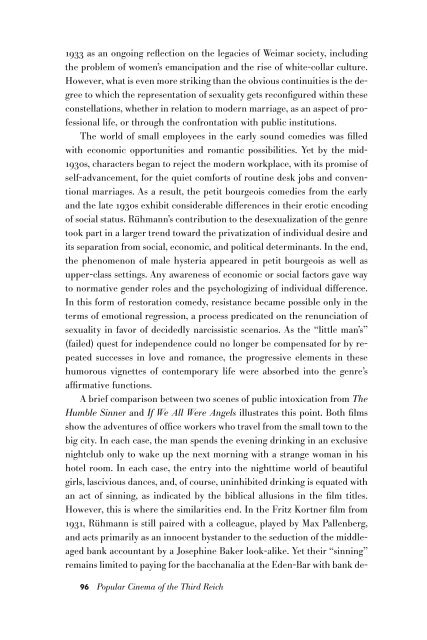You also want an ePaper? Increase the reach of your titles
YUMPU automatically turns print PDFs into web optimized ePapers that Google loves.
1933 as an ongoing reflection on the legacies of Weimar society, including<br />
the problem of women’s emancipation and the rise of white-collar culture.<br />
However, what is even more striking than the obvious continuities is the degree<br />
to which the representation of sexuality gets reconfigured within these<br />
constellations, whether in relation to modern marriage, as an aspect of professional<br />
life, or through the confrontation with public institutions.<br />
The world of small employees in the early sound comedies was filled<br />
with economic opportunities and romantic possibilities. Yet by the mid-<br />
1930s, characters began to reject the modern workplace, with its promise of<br />
self-advancement, for the quiet comforts of routine desk jobs and conventional<br />
marriages. As a result, the petit bourgeois comedies from the early<br />
and the late 1930s exhibit considerable differences in their erotic encoding<br />
of social status. Rühmann’s contribution to the desexualization of the genre<br />
took part in a larger trend toward the privatization of individual desire and<br />
its separation from social, economic, and political determinants. In the end,<br />
the phenomenon of male hysteria appeared in petit bourgeois as well as<br />
upper-class settings. Any awareness of economic or social factors gave way<br />
to normative gender roles and the psychologizing of individual difference.<br />
In this form of restoration comedy, resistance became possible only in the<br />
terms of emotional regression, a process predicated on the renunciation of<br />
sexuality in favor of decidedly narcissistic scenarios. As the “little man’s”<br />
(failed) quest for independence could no longer be compensated for by repeated<br />
successes in love and romance, the progressive elements in these<br />
humorous vignettes of contemporary life were absorbed into the genre’s<br />
affirmative functions.<br />
A brief comparison between two scenes of public intoxication from The<br />
Humble Sinner and If We All Were Angels illustrates this point. Both films<br />
show the adventures of office workers who travel from the small town to the<br />
big city. In each case, the man spends the evening drinking in an exclusive<br />
nightclub only to wake up the next morning with a strange woman in his<br />
hotel room. In each case, the entry into the nighttime world of beautiful<br />
girls, lascivious dances, and, of course, uninhibited drinking is equated with<br />
an act of sinning, as indicated by the biblical allusions in the film titles.<br />
However, this is where the similarities end. In the Fritz Kortner film from<br />
1931, Rühmann is still paired with a colleague, played by Max Pallenberg,<br />
and acts primarily as an innocent bystander to the seduction of the middleaged<br />
bank accountant by a Josephine Baker look-alike. Yet their “sinning”<br />
remains limited to paying for the bacchanalia at the Eden-Bar with bank de-<br />
96 Popular Cinema of the Third Reich

















